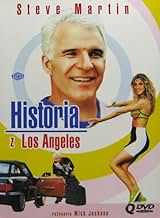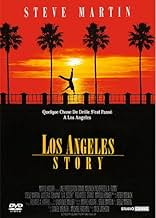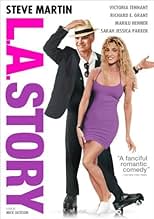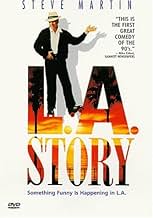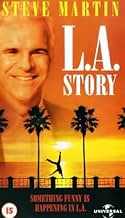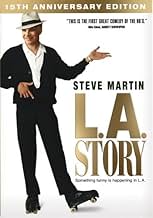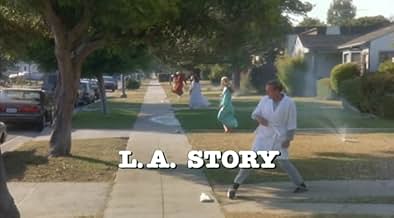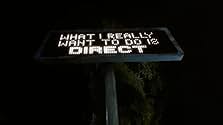With the help of a talking freeway billboard, a wacky weatherman tries to win the heart of an English newspaper reporter, who is struggling to make sense of the strange world of early 1990s ... Read allWith the help of a talking freeway billboard, a wacky weatherman tries to win the heart of an English newspaper reporter, who is struggling to make sense of the strange world of early 1990s Los Angeles.With the help of a talking freeway billboard, a wacky weatherman tries to win the heart of an English newspaper reporter, who is struggling to make sense of the strange world of early 1990s Los Angeles.
- Awards
- 3 nominations total
Eddie De Harp
- Maitre D' at Brunch
- (as Eddie DeHarp)
M.C. Shan
- Rap Waiter at L'Idiot
- (as M. C. Shan)
- Director
- Writer
- All cast & crew
- Production, box office & more at IMDbPro
Featured reviews
When Steve Martin is hot, he's really hot. L.A. Story, written by Steve Martin, is hot. The entire film keeps you in a state of constant chuckling. And, the movie has more than a few moments of comedic genius. It's the cumulative effect of little jokes littered throughout the film, both verbal and visual, that keeps you in stitches. On top of that, it piques your interest.
Here's what I mean: while Martin mercilessly it pokes fun of L.A. for it's flakiness, it's love and tolerance of idiosyncrasies, it's constant preoccupation with image, it's narcissism, the humor is never vulgar, crass, or shallow. For example, one scene takes place in the municipal art museum. We see Harry Telemacher (Steve Martin), with his friends, rapt in admiration for a painting. The camera angle comes from the canvas itself, where we watch Harry, deep in thought, dissertate on the subjects in the portrait, their motives, actions, and hidden agendas. He moves forward, backward, forward again, as if in active dialogue with the lacquer. At last, moving backward, he concludes his remarks by wrinkling his nose in disgust and saying `Look at the way he's holding her: it's almost filthy!' And then the camera moves around to Telemacher's perspective. The painting's a total abstraction. There isn't a distinct line in the entire rectangular frame. In the argot of Postmodernism, one might call it a `readerly' work of art.
It's the perfect metaphor for L.A., where you may interpret anything, any way you like. There's no standard, except one's own `personal reality.' No one can use social norms as a personal club to tell someone else, `You're wrong,' because there is none. It's all `what-E-verrrr.'
Best of all, L.A. Story is a love story, the kind of love that adores someone as much for their faults as for their virtues. Martin's satire is so effective because he loves the city so much.
Here's what I mean: while Martin mercilessly it pokes fun of L.A. for it's flakiness, it's love and tolerance of idiosyncrasies, it's constant preoccupation with image, it's narcissism, the humor is never vulgar, crass, or shallow. For example, one scene takes place in the municipal art museum. We see Harry Telemacher (Steve Martin), with his friends, rapt in admiration for a painting. The camera angle comes from the canvas itself, where we watch Harry, deep in thought, dissertate on the subjects in the portrait, their motives, actions, and hidden agendas. He moves forward, backward, forward again, as if in active dialogue with the lacquer. At last, moving backward, he concludes his remarks by wrinkling his nose in disgust and saying `Look at the way he's holding her: it's almost filthy!' And then the camera moves around to Telemacher's perspective. The painting's a total abstraction. There isn't a distinct line in the entire rectangular frame. In the argot of Postmodernism, one might call it a `readerly' work of art.
It's the perfect metaphor for L.A., where you may interpret anything, any way you like. There's no standard, except one's own `personal reality.' No one can use social norms as a personal club to tell someone else, `You're wrong,' because there is none. It's all `what-E-verrrr.'
Best of all, L.A. Story is a love story, the kind of love that adores someone as much for their faults as for their virtues. Martin's satire is so effective because he loves the city so much.
Outwardly, it's a ridiculous plot line. Steve Martin as the sensitive, wacky weatherman... falling in love with a British woman and somehow accidentally getting involved with the Sex in the City girl along the way. The reality of it is, though, there are so many charming details in the movie... vivid images and pictures painted in various scenes alluding to the childlike innocence of falling in love, the magic of letting yourself go and following the advice of an electric traffic sign... this movie become more enjoyable as you watch it more and shouldn't that be how a movie should be? Shouldn't it get more enjoyable instead of LESS enjoyable like most movies made today, that start with a shock and go downhill? Steve Martin shines throughout this movie and you share his gleeful moments... for example after he's tickled to find that his wife is having an affair with his agent and he converts his make-believe-shock into a dance as he approaches his then-a-symbol-of-affluence LeBaron in the street... when he tosses his hat to himself after he sets up another way to see the woman he is falling for... Simultaneously, though, you share his confusion as to how to handle the relationship with the over-energetic, giddy 23 year old he's accidentally fallen into bed with along the way. This is a complex movie that presents itself so innocently, you can't help but enjoy it. And, as a tribute to the brilliance of "The Man With Two Brains," he even manages to insert a portion of the (now legendary) "Pointy Birds" poem. In all, this is a worthwhile experience if you're willing to watch it all the way through. This is a movie for Steve Martin fans, because his unique, sensitive, accessible brand of humor and (more importantly) of life is apparent throughout.
Several years back, when I first sat down to watch "L.A. Story", my in-laws remarked that I was fortunate to be seeing this while living in that particular region (the jokes would make more sense). And they were spot-on. All of the movie's funniest gags are L.A. in-jokes (they're just surreal to outsiders): the angst-ridden 4-way stop, the smog, shrugging off earthquakes, the vapid lifestyles - these help the otherwise absurd freeway shootout and socially acceptable muggings work as comedy.
The movie functions pretty well as a romantic comedy/fantasy between Steve Martin and Vitoria Tennant, but it works a lot better when Martin see free-spirited (and charming as all get out) Sarah Jessica Parker).
But it works best as Martin's snide valentine to the culture.
7/10
The movie functions pretty well as a romantic comedy/fantasy between Steve Martin and Vitoria Tennant, but it works a lot better when Martin see free-spirited (and charming as all get out) Sarah Jessica Parker).
But it works best as Martin's snide valentine to the culture.
7/10
Quite similar to Woody Allen's Manhattan, and not quite as good, but pretty close to it. Steve Martin stands for comedy, and this movie is filled with jokes; some very funny others pretty stupid. What I like the most with this film is the acting of Sarah Jessica Parker; she is SO great. Overall, highly watchable.
7 or 8 out of 10.
7 or 8 out of 10.
L.A. Story is a tremendous romantic comedy just a notch below Moulon Rouge or High Fidelity, and similar to Roxanne. There are a lot of in-jokes for Californians, but I found the comedy accessible. The film is really stronger on the romance side, and has something to say about people who are somewhat phony and put up barriers to the world. As with Roxanne there is a little classic literature dropped in. There are quite a few cheesy moments where the lack of sophistication in the characters and plot does show. But there are also powerful, moving scenes, such as linking falling in love to the awe and wonder of childhood, and the airplane scene which brought tears to my eyes. And that's quite something; I almost never cry at the movies!
And of course, I loved the music by Enya! Check it out.
Who should see this film:
-- romantic comedy goers, a must see
-- action film guys like me, it's OK to see it with your SO (but see if you can get her to see Enemy at the Gate, too)
I'll give L.A. Story a surpassed-its-original-expectations 9 out of 10.
And of course, I loved the music by Enya! Check it out.
Who should see this film:
-- romantic comedy goers, a must see
-- action film guys like me, it's OK to see it with your SO (but see if you can get her to see Enemy at the Gate, too)
I'll give L.A. Story a surpassed-its-original-expectations 9 out of 10.
Did you know
- TriviaSteve Martin and Victoria Tennant were married at the time.
- GoofsIn the credits Sarah Jessica Parker's character is listed as "Sandy" and not "SanDeE*".
- Crazy creditsSanDeE* (Sarah Jessica Parker) is very peculiar about how her name is spelled. Still, the character is listed as "Sandy" in the credits.
- Alternate versionsA deleted scene featuring John Lithgow was reinstated in the cable-tv version of the film.
- How long is L.A. Story?Powered by Alexa
Details
- Release date
- Country of origin
- Languages
- Also known as
- LA Story
- Filming locations
- Ambassador Hotel - 3400 Wilshire Boulevard, Los Angeles, California, USA(entrance & foyer used as "L'Idiot Restaurant"/trellis area used for brunch restaurant/ballroom area used for the El Pollo Del Mar hotel rooms)
- Production companies
- See more company credits at IMDbPro
Box office
- Gross US & Canada
- $28,862,081
- Opening weekend US & Canada
- $6,616,915
- Feb 10, 1991
- Gross worldwide
- $28,862,081
- Runtime
- 1h 35m(95 min)
- Color
- Sound mix
- Aspect ratio
- 1.85 : 1
Contribute to this page
Suggest an edit or add missing content




